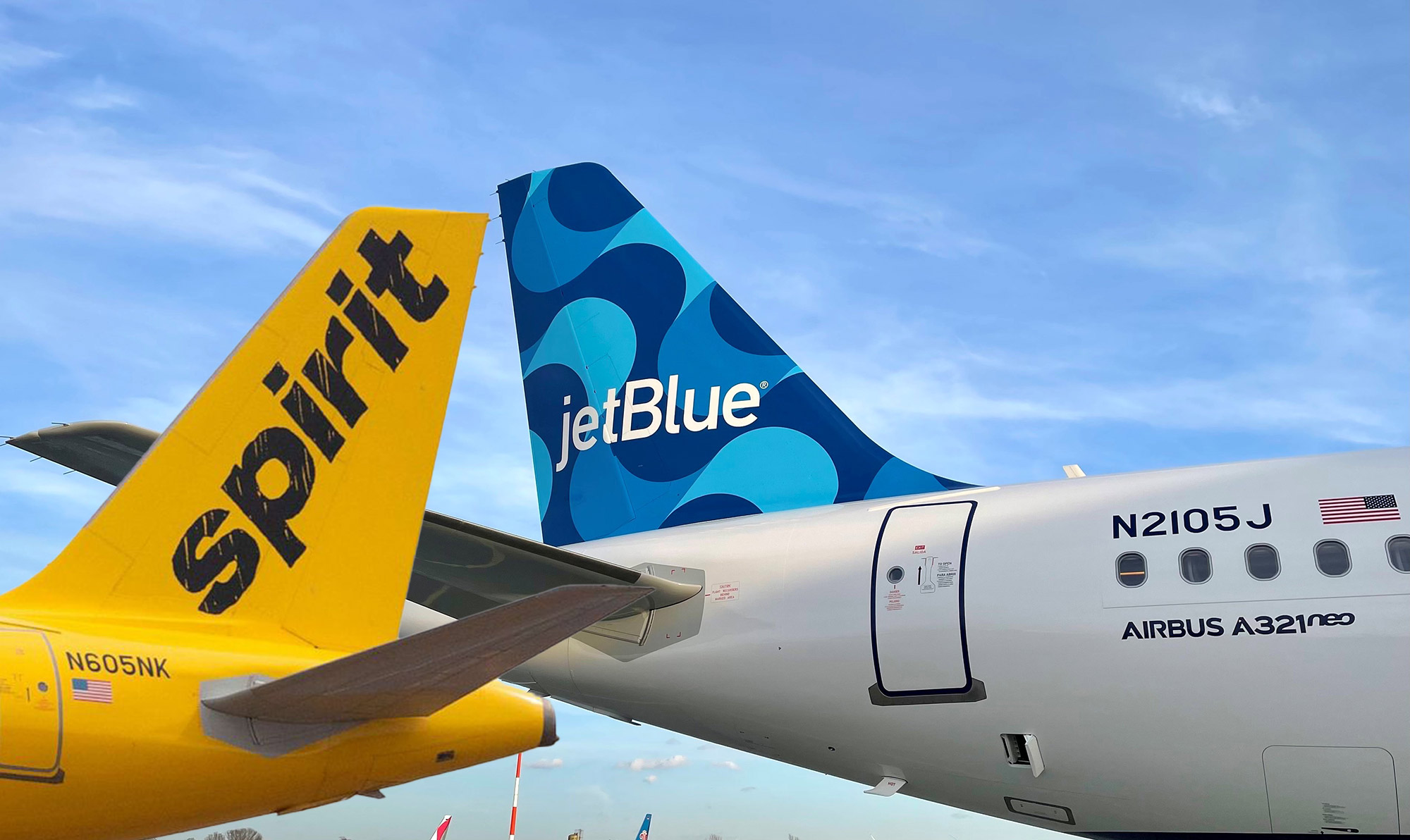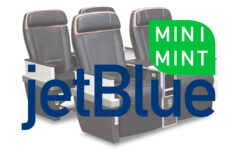
A previously reported story that JetBlue mistakenly failed to redact key information suggesting post-merger Spirit Airlines fares would rise 40% was inaccurate. It was the plaintiffs who are suing to block the merger who made such a claim.
JetBlue: No Smoking Gun That Fares Will Be 40% Higher Post-Merger
Underscoring what a big issue this is, three different people reached out from JetBlue to provide clarification on the matter. One told me, “Court documents are a filing from the plaintiff’s attorney, not JetBlue, and the plaintiffs are saying we would raise fares (JetBlue isn’t saying that). And, the comments that were to be redacted in the court filing are all the plaintiff’s interpretations of evidence, not direct quotes or evidence from JetBlue documents or evidence we provided.”
Here is JetBlue’s official statement:
Unfortunately, following a filing error by the legal team for a group of consumers that has filed a baseless lawsuit, we are in a position where we need to correct the record.
To be very clear, the claims reported by several media outlets did not reflect facts set out in JetBlue documents. Private plaintiffs represented by the merger class action lawyer, Alioto, in a the court filing laying out their arguments opposing our motion for summary judgment, incorrectly redacted sections of text so that it could be read by cutting and pasting into a new document.
As we attempted to clarify yesterday, it is important to understand that the redacted text was content written and produced by Alioto in their own court filing, not redactions to JetBlue internal documents. These redactions were in text where Alioto had outlined, in their own words, their argument to the court, and essentially represents the plaintiff’s “spin” on confidential evidence they have reviewed. It’s no surprise a class action attorney would mispresent the facts in a brief to the court to preserve their case.
The factual evidence, when presented in a full and complete picture, will demonstrate that JetBlue intends for the merger with Spirit to increase competition and help lower fares across the board while also bringing JetBlue’s high-quality and much-loved experience to millions more travels.
We hope this clarifies the story and are glad to see that JetBlue was not foolish enough to put in writing that fares would rise to this extent post-merger. Even factoring in lower ancillary fees on JetBlue that translate to higher base fares, I still do not expect the super cheap fares that travelers packing lightly have been able to take advantage of, will survive. The question of how much fares will rise remains unanswered.
The original story, which has proven inaccurate, appears below.
JetBlue has made an unforced error in failing to redact information suggesting it forecasts fares of up to 40% higher on Spirit Airlines planes post-merger. This may simply be an official confirmation of what was already obvious, but it still will hurt efforts to complete the merger.
JetBlue Admits What We Already Knew: Fares Will Rise After Spirit Merger
JetBlue not only faces government scrutiny over the planned merger with Spirit Airlines, but also faces a civil lawsuit from Spirit customers claiming JetBlue’s proposed acquisition would “substantially lessen competition and create a monopoly in the passenger airline industry.” During the process of discovery, JetBlue’s lawyers failed to redact a key piece of information:
Those details show that in mapping out the merger’s impacts on its revenues, JetBlue Airways Corp. “modelled for price increases and capacity reductions” by removing an average of 24 seats “from every one of Spirit’s roughly 200 planes.”
“Indeed, JetBlue plans to increase fares on aircraft it acquires from Spirit by at least 24%,” the travelers said in one section that was supposed to be redacted. And, according to the redacted text, JetBlue believes that number “is a conservative estimate, and that fare increases may be as high as 40%. … Thus, there is direct evidence in the form of party admissions that the merger will have anticompetitive effects.”
Documents from JetBlue also reveal perhaps an even more critical matter in terms of the merger’s effect on competition: prices on routes in which Spirit exits will typically rise by 30%:
“JetBlue acknowledges that Spirit’s exit from a route results in market-wide price increases of all other airlines serving that route by 30%.”
This makes it harder for JetBlue to claim that the merger does not impact other passengers, regardless of the carrier they choose.
JetBlue now asserts these figures are taken out of context:
“Private plaintiffs’ counsel failed to properly redact certain information which, taken out of context, creates a completely inaccurate picture of the facts. We are confident that our merger with Spirit will give a much-needed boost to airline competition in the U.S. and result in more low fares and higher-quality service for customers. We look forward to laying out all of the evidence to support our case this October.”
In JetBlue’s defense, Spirit Airlines fares are very low, but often deceptively low considering they are totally unbundled. If fares are 40% higher post-merger but include the sort of things that consumers would purchase anyway, then the difference is more muted.
But unlike One Mile At A Time, I do not necessarily agree that “Spirit nickels and dimes for everything, while JetBlue doesn’t.” JetBlue does provide complimentary non-alcoholic beverages, snacks, and wi-fi onboard and that’s a big deal. But on its lowest fares it does not include a carry-on bag or checked bag (just a personal item) and that is no different than Spirit and likely the primary source of ancillary revenue.
Furthermore, for those passengers who are able to travel light or do not mind the extras, fares are typically quite low on Spirit. And when other carriers match Spirit’s pricing, all travelers win. It’s not my favorite business model, but Spirit has been historically profitable so to say that the Spirit way creates unsustainably low fares is not convincing. JetBlue’s “half-in, half-out” model of going beyond full-service carriers in some areas and not in others has created a business model that appears unsustainable (at least based on the lack of profit).
Sure, the talking head politicians will seize on this for a “gotcha” moment for re-election soundbites, but the idea that this merger is good for customers (which should be a separate issue from whether the merger should legally be allowed) is certainly not clear.
CONCLUSION
JetBlue has made its job harder thanks to a sloppy job of redacting by its attorneys. While this information may have only confirmed what was already obvious, it does buck the narrative that JetBlue has repeated that its merger with Spirit will lead to lower fares. That appears increasingly to be unlikely, as JetBlue itself admits and regardless of what the overall or all-in fares might include.
(H/T: View From The Wing)




Hey DOJ where were you when Alaska bought Virgin… people loved Virgin America, no one likes spirit
If no one likes Spirit then why are their flights always full? The truth is people prefer Spirit because they have lower ticket costs and an excellent safety record.
Those cheap fares are temporary. Spirit is hemorrhaging cash, losing over $1.5B the last few years. Its used uneconomically priced fares to increase market share but can’t do it forever. Whether this merger is approved or not its fares will rise. If Spirit files bankruptcy those fares will be likely replaced by one of the majors at far higher than Jet Blue prices. Remember, Jet Blue is a discount carrier, it just hasn’t stripped checked baggage and other amenties from the fare.
@Randy Hill – That assumption is also that Spirit would be dissolved (for another carrier to scoop them up) which is unlikely even if it were to file bankruptcy. United, Delta, and many others filed bankruptcy without any divestitures or mergers. There’s no reason to believe that Spirit is at a point of filing, nor that if it were to file that it would then cede those routes or become acquired by another carrier.
Furthermore, JetBlue has not only stripped checked bags on most fares, but carry-on bags from its basic fares.
I’m curious to see if the higher fares will lead to a…”more elevated” quality of people on the flights and less news stories about gate area and in-flight disturbances, fights, etc.
A few attorneys have egg on their face!! ;-{
The only way out of this fiasco is to show that:
– a 5th nation wide airline will warm up competition on overlapping routes like it was when Continental, NorthWest, TWA, AmericanWest, AA, DL, & UA were fighting it out for market share.
– the current situation (the Big Three) is a monopoly since Alaska, Hawaiian, & B6 cannot truly compete with the traditional trunk lines
– the Big Three have a monopoly over regional service via American Eagle, Delta Connect, & United Express
– any loss in the LCC orbit (Spirit, Allegiant, SW) will immediately be supplemented by additional carriers like Breeze or Avelo
JetBlue is not quite the bargain many think. While JetBlue and American shared the Boston-LaGuardia market, getting a JetBlue seat with extra legroom (a reservation fee and extra leg room fee)), and checking a bag (additional fee), the one-way price came to about the same as first class on American (if you bought your ticket in advance). I was furious when there were no more American flights, and started using Delta.
First of all this has already been revealed to be incorrect as the redacted files were actually not from jetblue but from the other side of the suit. It’s the other sides argument against jetblue, not their business plan. That being said, of course they are going to dissolve spirit and their zero leg room pay for literally everything business model. By the time you pay all their ancillary fees they are just as expensive as a legacy carrier let alone jetblue. Often more expensive. So no service, no legroom, crazy fees and at the end of the day equal costs. The business model the consumer and literally the government itself has been trying to legislate out of existence for decades. So jetblue swoops in and tried to take care of that for them, and the same divisions if not the same members of government begin a legal battle to stop it. “Our consumers need to be wedged into a cattle car with no services all while being charged to death with hidden fees. We oppose making things better for a few dollars more.”
Of course jetblue is going to charge more. But they are still an LCC, albeit not an ULCC that everyone hates. Of course jetblue was going to take out 30 seats to give their customers more legroom and of course that would cost a few dollars more. And that’s not even to get the more expensive “even more space” seats. Jetblues regular seats have a ton of more then Spirit or even American etc etc. And these seats have cushions and aren’t plastic lawn chairs bolted to the floor of an Airbus only mean to hold 200….but now have dozens more.
This whole endeavor against the merger is so backwards. “Spirit isn’t providing our constituents proper service”
“We can’t let jetblue buy spirit because our constituents would actually finally get proper service”
It’s simply wrong to suggest that Spirit costs the same once ancillary fees are factored in, as if those fees are mandatory. They are not – and many Spirit customers happily travel without them. If consumers wish to be wedged in exchange for $29 fares, they should be allowed to. My beef is never that Spirit Airlines is not providing “proper service.” Don’t push strawmen on us.
Spirit forces other carriers to match. As a consumer, I like that. That doesn’t implicate whether the merger should be legal or not, but it is why I am personally against it.
Matt, the problem is Spirit is losing massive amounts on those fares, it can’t last whether this merger is completed or not. Merging with JetBlue will keep fares a lot lower than the majors getting to scoop up Spirit routes from its bankruptcy.
@Randy Hill – Spirit has been profitable three of the last four quarters and isn’t close to bankruptcy.
A 40% increase on $39 that includes a checked bag, tv and wifi…Mathew Klint, you should do your research.
No, does not include checked baggage and TV/Wi-Fi are things that I mentioned, but not things a budget traveler may particularly care about.
I love Jetblue and just flew with them DCA-FLL recently. Wonderful experience. I actually kind of like Spirit being a separate, low frills airline similar to, say, Vegas existing in that there’s the low budget traveler who will fly on Spirit or bus on greyhound and they should have that option. Some poor kid from a trailer park may not be able to attend granny’s funeral for more than $100 bucks even if they might suffer flight delays or cancellations and having to jump through hoops. I prefer decent carriers because I want to ENJOY my flight experience and am willing to pay more for that.
The problem with mergers in general is less competition and usually less availability. The corporate types always get their bonuses from “consolidation” meaning layoffs so they’ll squeeze what are already understaffed due-to-covid-era staffing and raise rates on both Jetblue and Spirit. Jetblue Flyers tend to be budget minded folk who also love good treatment, what I think SouthWest used to be like.
We need MORE airlines, not less.
For all this talk of The Free Market, I don’t see new airlines popping up to improve things. Jetblue will probably merge with a legacy carrier in 10 years anyway (mark my words!!!) and then we’ll see higher prices again. Spirit is doing well in their market niche, why mess it up?
All are harping on individual airline tickets, yet no mention of hubs, focus cities, & competition:
– B6 is focused on the east coast (BOS, JFK, FLL & MCO); west coast (LAX); and the Caribbean (SAN)
– NK is more focused on the heart land (ATL, ORD, DFW, DTW, IAH, LAS); with overlaps at MCO & FLL
– the combined B6/NK will be competing head on with established trunk line carriers (DL, UA, AA, WN) in each of the above airports via hub, focus city, and/or crew base scenarios
– the competing airlines will dictate the fares that are charged by B6/NK, not the newly merged airline.
– once a competitor feels threaten at one of its bases, an ensuing price war will develop in which no one wins
B6 has no choice. It missed its opportunity when it let Virgin America pass thru its fingers. It needs Spirit for long therm growth and survival. If not, someone else will suck it up and we’ll all cry about a lost opportunity.
I hope they raise the fares even more! Maybe that will get rid of some of the ghetto passengers that Spirit seems to attract. Strop the brawls at the ticket counters.
One thing is for sure…if the B6/NK merger succeeds, the Frontier Airlines inflight/gate/baggage claim entertainment [brawls] will be EPIC!!!!
There won’t be any competition for these people to book!